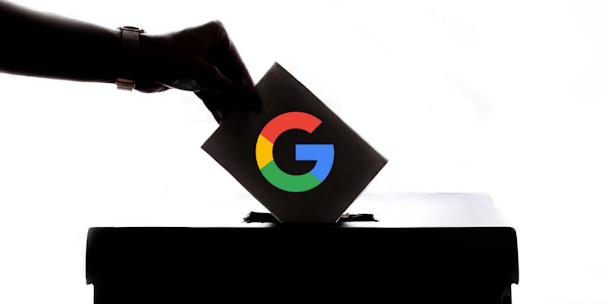Will Google's retreat from micro-targeted political ads protect elections?
As the UK general election campaign gathers pace, Google has announced sweeping changes in micro-targeted political ads. This is a "middle ground" Google hopes "will be both broadly palatable and easily actionable" against increasingly imminent regulation, according to Benedict Pringle, founder of the Political Advertising website.

Does Google's move from targeted political ads protect the ballot box?
The tech giant is restricting targeted ads that mention political candidates, parties or ballot measures. It is favouring contextual fields like age, gender and postcode over those like political affiliation (not allowed in the UK) or public voter records.
Now campaigns can't match their database of prospective voters with any of Google's platforms. Meanwhile on YouTube, doctored videos, deepfakes and “demonstrably false claims” could lead to a ban.
There are fears microtargeting can be weaponised and prove a breeding ground for misinformation with little transparency. An international group of lawmakers earlier this month told the International Committee on Disinformation and Fake News to suspend targeted political adverts on social media or face "dire" consequences.
Pringle said: "Google’s move to clamp down on micro-targeted political ads is based on the perspective that democratic politics relies on the open debate of ideas.
"Google feels that in a democracy it’s unhelpful for one group of voters to think a party stands for one thing, while another group thinks it stands for another. It will also worry that there is almost zero regulation of political advertising, micro-targeting is an area where campaigns could conduct malpractice as journalists and watchdogs can’t easily hold them to account."
Steve Kuncewicz, partner at BLM Law firm and specialist in social media law, said that elections around the world are increasingly fought and potentially won online, prompting the need for greater oversight.
"The content of political advertising tends to be fairly unregulated, save in relation to funding disclaimers in the US and Party Political Broadcast ads in the UK, but as at least some regulation of the online world is starting to become more and more possible," said Kuncewicz.
Twitter, Snap and Facebook
Tom Jarvis, founder and managing director at Wilderness Agency, welcomed Google's changes after a "deafening silence" from other platforms following Twitter's ban on political ads. Now it needs to define and police what a ‘political’ ad even is.
Twitter's chief executive Jack Dorsey said: "We believe political message reach should be earned, not bought," adding that these digital ads force "highly optimized and targeted political messages on people".
Snap will fact check and verify all political ads it runs. Last week it messaged all UK users urging them to register to vote, which drove a drastic spike in registrations. Snap chief executive Evan Spiegel, said earlier this week: “We try to create a place for political ads on our platform, especially because we reach so many young people and first-time voters we want them to be able to engage with the political conversation, but we don’t allow things like misinformation to appear in that advertising."
Chinese-owned TikTok won't touch political ads. Meanwhile, Facebook is holding out. It currently allows microtargeted political ads and won't fact check them, citing free speech.
However, it has extended transparency measures from political ads to encompass social issues such as immigration, health and the environment. It aims to label political misinformation and ban ads that encourage non-participation. It is also labeling state-funded media and incorporating more tools to allow people to analyse specific ads. Just 0.5% of its ad revenue comes from political ads.
But now one of its closest rivals has taken a stronger stance against microtargeting and misinformation.
Jarvis concluded: “Despite Facebook’s reluctance, Google is pressing ahead with these changes at breakneck speed to have the new rules in place ahead of the UK election in December.”
Kuncewicz outlined Facebook's stubbornness.
"Facebook has refused to do so – even in the face of the Cambridge Analytica scandal which revolved around surreptitious microtargeting of users and saw the company agreeing to pay the ICO’s recent £500,000 fine – without an admission of liability."
Politics vs Privacy
There is a move away from the use of first-party data in political advertising. Kuncewicz said using these was "inherently risky" anyway as it "tended to happen without the user’s knowledge" and warned that all advertisers are having to exercise caution when using first-party data.
The ICO is increasingly policing the space and IAB Europe is guiding consent management platforms with a new tool.
Kuncewicz said: "Microtargeted ads are becoming a riskier proposition in general, and the debate around political advertising looks to be giving some of the major platforms an opportunity to nail their colours to a particular mast."
Google's new rules land in the UK before the general election and then globally on January 6, 2020. Pringle expressed regret that it is media owners and not governments that are deciding what measures should be taken.
He said: "Political advertising online when well-regulated can be a force for good. Research shows that voters exposed to more political advertising end up knowing more about the issues at stake in an election. But without effective regulation bad things happen – as we saw with the Conservative Party ‘factcheckuk’ farce and the Kier Starmer/Piers Morgan interview remix. The temptation for tech platforms to close their doors to political advertising completely will soon be irresistible and our democracy will be worse off for it."
Time will tell how each platform's policies are executed. The Guardian reported that Google was underreporting spending on UK political ads by as much as a factor of a thousand. In the age of microtargeting, parties can launch thousands of different ads at any given time.
Grand gestures and rule changes don't protect elections if they are not properly enforced.

